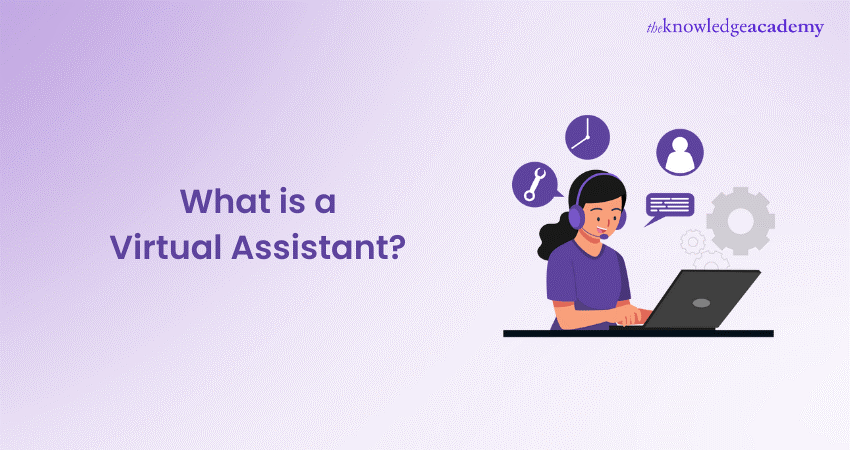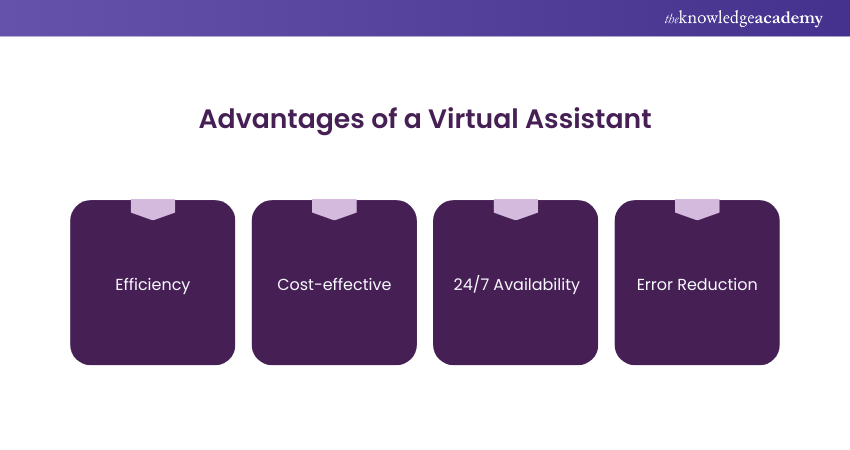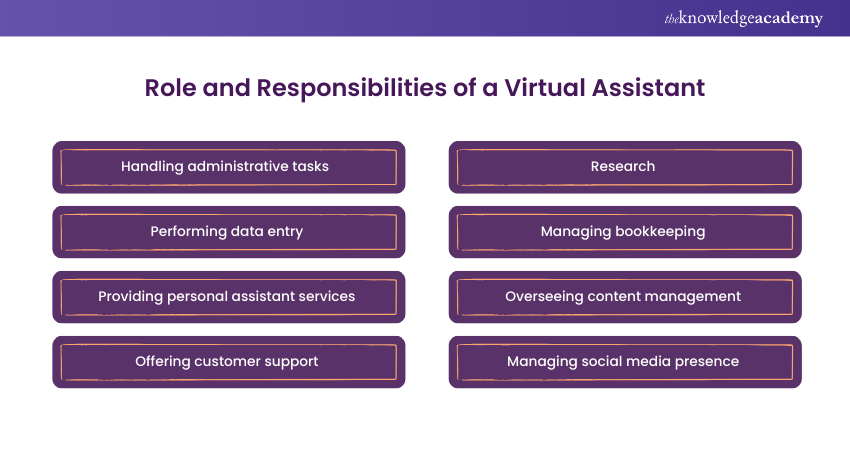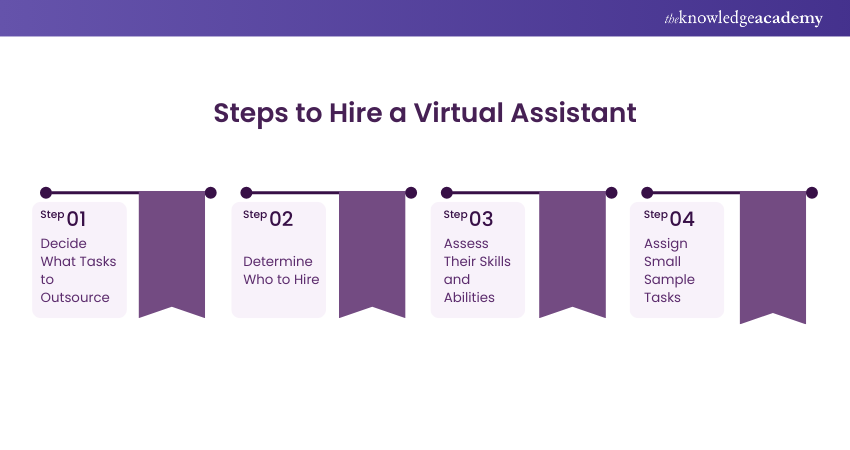We may not have the course you’re looking for. If you enquire or give us a call on 01344203999 and speak to our training experts, we may still be able to help with your training requirements.
Training Outcomes Within Your Budget!
We ensure quality, budget-alignment, and timely delivery by our expert instructors.

Have you ever thought about how successful companies manage to stay on top of their workload without feeling stressed? Possibly, a Virtual Assistant (VA) could be the key. A Virtual Assistant is a distant expert who handles important duties such as managing emails, arranging appointments, and even managing social media. Businesses can concentrate on important aspects like growth and innovation by transferring these responsibilities.
This assistance aids businesses, regardless of their size, in maintaining organisation and productivity without the burden of daily administrative tasks. Let's uncover the What is a Virtual Assistant and how it helps you stay competitive in a rapidly changing environment.
Table of Contents
1) What is a Virtual Assistant?
2) How Does a Virtual Assistant Work?
3) Advantages of a Virtual Assistant
4) Types of Virtual Assistants
5) What Does a Virtual Assistant do?
6) Benefits of a Virtual Assistant
7) How to Hire a Virtual Assistant?
8) Conclusion
What is a Virtual Assistant?
A Virtual Assistant (VA) is a proficient professional who provides specialised assistance from a distance. A VA could also be a Software, skilled in managing various tasks proficiently. They are competent in a wide range of tasks, from basic administrative duties to intricate and specialised projects, customised to fit the specific requirements of every client.
The main job of a Virtual Assistant is to greatly enhance productivity and efficiency in a business or personal environment. With a deep knowledge of different tools and technologies, Virtual Assistants can handle calendars, sort emails, carry out research, and more. Their ability to adjust easily and effectively is extremely useful in both professional and personal areas, enabling clients to concentrate on important goals.
From handling day-to-day tasks to taking on complex projects, Virtual Assistants provide top-tier assistance in the digital era. They symbolise a revolutionary change in the way tasks are completed, blending their skills with the ease of remote access. As we progress deeper into a technology-based society, Virtual Assistants are changing the expectations for productivity and efficiency, providing expert help and assistance constantly.
How Does a Virtual Assistant Work?
A Virtual Assistant operates on Artifical Intelligence (AI) and Machine Learning (ML) principles, bringing a new dimension to task automation. At its core, a Virtual Assistant is an application designed to comprehend and execute tasks without constant human oversight. It relies on advanced algorithms to interpret user commands, learn from interactions, and adapt to evolving needs over time.
The process starts with the user entering commands or queries, and the Virtual Assistant uses natural language processing to interpret. . Leveraging pre-programmed knowledge and continuous learning from user interactions, it refines its ability to provide accurate and contextually relevant responses. This learning process enables Virtual Assistants to evolve, becoming more adept at anticipating user needs.
Furthermore, Virtual Assistants can integrate with other applications and systems, allowing them to access and manipulate data across various platforms. This seamless integration enhance their ability to manage various tasks, from simple queries to intrinsic problem-solving, making them essential in our digital world.
Master essential skills and boost your career with our Virtual Assistant Course – Register now!
Advantages of a Virtual Assistant
Virtual Assistants offer a plethora of advantages, making them indispensable in today's digital landscape. Here are some key benefits:

1) Efficiency: Virtual Assistants excel at handling routine tasks, freeing up valuable time for individuals and businesses. Whether it's managing calendars, scheduling appointments, or automating data entry, Virtual Assistants bring a level of efficiency that is unparalleled.
2) Cost-effective: They provide a cost-effective solution compared to hiring full-time employees for specific roles. Virtual Assistants offer a budget-friendly alternative to traditional employment models, eliminating the need for extensive onboarding, training, and employee benefits.
3) 24/7 Availability: Virtual Assistants operate round the clock, ensuring uninterrupted support and service. Unlike human employees constrained by working hours, Virtual Assistants are available 24/7, providing consistent and reliable support.
4) Error Reduction: Their precision in executing tasks minimises the risk of errors associated with human involvement. Virtual Assistants, driven by algorithms and automation, execute tasks meticulously, significantly reducing the likelihood of errors.
Start learning and become a pro with the Online Product Reviewer Training – Sign up now!
Types of Virtual Assistants
There are various types of Virtual Assistants, each tailored to specific needs. Let's explore three prominent categories:
1) AI Chatbots: AI chatbots are text-based Virtual Assistants that engage in conversations with users. They are commonly used for customer support, providing instant responses to queries and guiding users through processes.
2) Conversational Agents: Conversational agents, also known as virtual agents or chatbots, are more advanced than AI chatbots. They can comprehend natural language, making interactions with users more human-like.
3) AI Virtual Assistants: AI Virtual Assistants encompass a broader range of tasks. They can handle complex instructions, learn from user behaviour, and adapt to evolving requirements over time.
Stay ahead in the Online Business world with our Online Product Manager Course - Register today!
What Does a Virtual Assistant do?
Virtual Assistants are versatile and can undertake various roles. Here are eight everyday tasks they excel at:

1) Handling Administrative Tasks : Virtual Assistants efficiently manage administrative tasks, such as organising calendars, scheduling appointments, and handling other clerical duties. Their automation capabilities streamline processes, boosting organisation and productivity, enabling individuals and businesses to focus on their key responsibilities.
2) Performing Data Entry : The automation of data entry tasks by Virtual Assistants ensures a high level of accuracy and time-saving benefits. This allows individuals and businesses to focus on key operations, trusting the reliability of automated Data Management processes.
3) Providing Personal Assistant Services: Functioning as reliable personal assistants, Virtual Assistants go beyond mere task management. They excel at setting reminders, sending personalised messages, adapting to individual preferences, and adding a human touch to their digital assistance.
4) Offering Customer Support: AI chatbots and virtual agents deliver prompt and efficient customer support. By addressing inquiries in real time and enhancing user satisfaction, these Virtual Assistants contribute significantly to a positive customer experience.
5) Research: Virtual Assistants are adept at gathering information and conducting market research, presenting their findings in a concise and organised manner. Their analytical capabilities streamline the research process, providing valuable insights for informed decision-making.
6) Managing Bookkeeping: Automated bookkeeping tasks, including tracking expenses and generating financial reports, fall within the capabilities of Virtual Assistants. This ensures accuracy in financial records and frees up time for individuals and businesses to focus on strategic financial planning.
7) Overseeing Content Management: Virtual Assistants contribute to efficient content management by organising and categorising information. Their ability to suggest improvements streamlines content creation and organisation processes, ensuring a more cohesive and engaging online presence.
8) Managing Social Media Presence: From posting updates to analysing engagement metrics, Virtual Assistants actively contribute to maintaining a strong social media presence. Their automation capabilities enhance efficiency in social media management, allowing businesses to stay connected with their audience effectively.
Boost your teaching skills with expert-led Online Teacher Training —Join now to excel!
Benefits of a Virtual Assistant
Employing a Virtual Assistant has the potential to significantly impact both businesses and individuals. Listed below are the main advantages of utilising a Virtual Assistant:
1) Enhanced Productivity: Virtual Assistants take care of tasks that consume time, enabling you to concentrate on crucial business tasks that promote expansion.
2) Cost-Effective: Virtual assistants, unlike full-time employees, operate remotely, which reduces expenses for office space, equipment, and benefits.
3) Flexibility and Scalability: Virtual Assistants provide adaptable work schedules, adjusting to your availability and workload, particularly during peak times.
4) Access to Expertise: Accessing specialised skills in domains like social media management, content creation, and customer service is made possible by Virtual Assistants who cater to your specific requirements.
5) Improved Work-life Balance: Assigning tasks to a Virtual Assistant gives you more time, decreases stress, and enables a healthier work-life balance.
6) Increased Efficiency: Virtual Assistants optimise operations by efficiently handling tasks such as arranging appointments, managing emails, and inputting data accurately and swiftly.
7) Focus on Strategic Planning: By removing routine tasks, you can allocate more time to strategic planning and business development projects.
8) 24/7 Availability: Numerous Virtual Assistants are available around the clock in various time zones to ensure your business operations run effortlessly.
9) Reduced Administrative Load: Virtual Assistants handle administrative tasks, allowing you to reduce paperwork and stay orderly.
10) Enhanced Customer Experience: Virtual assistants handle customer queries and deliver prompt replies, enhancing overall customer happiness.
11) Adaptable to Business Needs: Virtual Assistants can adjust their services to meet the specific requirements of your business, whether you require part-time or full-time support.
12) Focus on Core Competencies: By delegating non-essential responsibilities to others, you can allocate more time to what you do best, leading to increased productivity.
Hiring a Virtual Assistant enables you to streamline activities, cut expenses, and concentrate on key factors for your business expansion.
Want to break into the world of remote work? Learn How to Become a Virtual Assistant? with our step-by-step guide! Click here to start your journey toward flexibility and freedom!
How to Hire a Virtual Assistant?
Hiring a Virtual Assistant can smoothen your workload, but finding the right one requires careful planning and evaluation. Let’s see how you can do it:

Step 1: Decide What Tasks to Outsource
Identifying the tasks you need help with is crucial. Focus on urgent tasks or those where you need the most assistance.
a) Create a Master To-Do List: Record everything you do daily, weekly, and monthly in your business. Organise tasks into categories such as administrative, marketing, or customer service. Decide which tasks to handle yourself and which to outsource.
b) Use a Time Tracker: Track the time spent on each task to identify time-consuming activities, which are often ideal for outsourcing.
Step 2: Determine Who to Hire
List the must-have qualities for your Virtual Assistant, focusing on logistical, professional, and technical skills.
a) Logistics: Ensure they speak the required languages, work within a compatible time zone, and fit your budget.
b) Professional Traits: Look for reliability, resourcefulness, flexibility, proactivity, organisation, collaboration, and good communication skills.
c) Technical Skills: Consider industry-specific experience and familiarity with tools like Excel or AI content creation software.
Step 3: Assess Their Skills and Abilities
When interviewing, ask questions that evaluate their skills and match your communication style.
Ask about their skills, strengths, weaknesses, and availability. Ensure they are comfortable with your productivity tools.
Evaluate their problem-solving skills by asking how they’ve handled difficult instructions in the past.
Step 4: Assign Small Sample Tasks
Test your top candidates with small tasks like your needs. For example:
a) Schedule an appointment
b) Input data
c) Organise emails
d) Manage social media posts
These tasks help assess their capabilities and willingness to learn new skills.
Conclusion
To sum up, a Virtual Assistant is a flexible expert providing valuable assistance in personal and professional environments. A Virtual Assistant enhances productivity, efficiency, and focus on core goals by managing various tasks. Utilising a Virtual Assistant can revolutionise how companies handle tasks and optimise processes. With the advancement of technology, the significance and value of a Virtual Assistant's role will only increase.
Boost your sales skills and career with our Virtual Salesperson Training today!
Frequently Asked Questions

The typical annual income for a Virtual Assistant can vary between £17K - £36K as per Glassdoor. This is based on factors such as expertise, qualifications, where they work, and the field they are in. Specialised skills, client type, workload, and certifications are all factors that influence how much virtual assistants can charge.

Becoming a Virtual Assistant demands no formal education, but training in administration, communication, or tehnical skills is beneficial. Many VAs have backgrounds in business, marketing, or customer service. Skills like Time Management, software proficiency, and certifications can boost job prospects.

The Knowledge Academy takes global learning to new heights, offering over 30,000 online courses across 490+ locations in 220 countries. This expansive reach ensures accessibility and convenience for learners worldwide.
Alongside our diverse Online Course Catalogue, encompassing 17 major categories, we go the extra mile by providing a plethora of free educational Online Resources like News updates, Blogs, videos, webinars, and interview questions. Tailoring learning experiences further, professionals can maximise value with customisable Course Bundles of TKA.

The Knowledge Academy’s Knowledge Pass, a prepaid voucher, adds another layer of flexibility, allowing course bookings over a 12-month period. Join us on a journey where education knows no bounds.

The Knowledge Academy offers various Virtual Online Job Roles Training, including the Virtual Assistant Course, Online Teacher Training, and Virtual Salesperson Training. These courses cater to different skill levels, providing comprehensive insights into How to Become a Virtual Assistant.
Our Business Skills Blogs cover a range of topics related to Earned Value Management, offering valuable resources, best practices, and industry insights. Whether you are a beginner or looking to advance your Project Management skills, The Knowledge Academy's diverse courses and informative blogs have got you covered.
Upcoming Business Skills Resources Batches & Dates
Date
 Virtual Assistant Course
Virtual Assistant Course
Fri 7th Feb 2025
Fri 4th Apr 2025
Fri 6th Jun 2025
Fri 8th Aug 2025
Fri 3rd Oct 2025
Fri 5th Dec 2025







 Top Rated Course
Top Rated Course



 If you wish to make any changes to your course, please
If you wish to make any changes to your course, please


